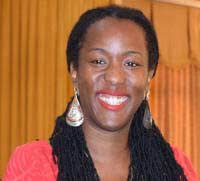Sex-disaggregated data needed for better disaster relief

Sex-disaggregated data is of tantamount importance when dealing with disaster management. If there is no sex-disaggregated data, the full experiences of women, and the unrecognised labour and suffering they experience, will continue to be made invisible.
This was one of the topics discussed at the UN Women Caribbean's launch of the Summary Status of Women and Men Report.
Tonni Brodber, a representative at UN Women Caribbean, said sex-disaggregated data was important because women and men experience life differently and if there is no sex-specific data collection, help for women cannot be provided.
"When we have a gap in this kind of data, we are unable to respond effectively...If you don't have data that is collected and specifically presented disaggregated by sex as a primary and overall classification, we won't know whether men or women are being affected in these kinds of ways."
She said if researchers are not looking at data that reflects gender issues, then women will not get the aid they need.
"What are the questions and problems and different concerns that are related to all the different aspects of women and men's lives? If you are not getting your data, how are you going to be able to accurately respond?
"And you need the data in order to adequately reflect that not all women and men are the same. There are diversities in the way that women live, and diversities in ways in which men live in countries," she said.
The report showed how the pandemic affected women and men differently and unequally. Some of the ways included unpaid care work; spikes in domestic violence; disproportionate job loss because of tourism and the tourism industries closing; and the difficulty of balancing work and domestic duties because of the increased, unacknowledged domestic labour women have to do in the household, especially with schools being closed.
The summary report provides a gender analysis of the labour force in certain Caricom countries: Barbados, Grenada, Guyana, Jamaica, St Lucia and TT. It also gives insight into progress made towards achieving gender equality in the world of work.
Janey Joseph, from the Division of Gender Relations in St Lucia, said she has noted there was a spike in unpaid care work.
"Women are at home with children who can't afford to be at schools right now because schools are closed. Because of that, their responsibility has increased and it has prevented them from accessing jobs that may be available as the economy is opening up a little. The number of hours they are able to spend at work has also decreased."
St Lucia's gender division also noticed an increase in domestic-violence reporting, but cannot definitively link it to covid19 restrictions.
"Part of the data difficulties makes it difficult to assess the degree to which that decrease is covid-specific. There have been reports of increased incidents, and the severity of those incidents have increased."
Joseph said men, however, did not experience as bad job loss as women, because men were in job sectors that were not as affected by the pandemic. Construction is one male-dominated field that was not affected by covid19, unlike tourism, which employs more women.
"Men were not where the highest job cuts were. The job industries such as construction industries that continued during the pandemic, they are dominated by men. They continue having access to that kind of options for receiving money."
Key findings from the report:
In all six countries, women were more likely to be highly educated than men, but the employment rate was lower for women than men. In all countries, the unemployment rate was higher for women than men, the report said.
Occupational sex segregation was evident in all countries.
Women were most strongly over-represented in the clerical category, and men were more likely to work with machines, tools and objects, it noted. Women are more likely to work with and for people.
As women tend to be more highly educated than men, it was expected that women’s earnings, on average, would be higher than those of men. However, this was not the case. The female hourly-rate was less than 100 per cent of the male rate in all countries except in Barbados, where the rates were the same, and Jamaica.
Women’s earnings, once disaggregated by educational level, were lower than those of men, meaning women did not receive the same reward for education that men do.
Men were more likely than women to be employed if there are children under five in their household. Those of peak productive age, who were the most likely to be employed, may also be those most likely to be fathering and thus living with young children.
The same logic does not apply to women, the report said.
Although women in this age group were most likely to bear and have young children living in the household, their disproportionate responsibility for caring for them limited the extent to which they can engage in economic work.

Comments
"Sex-disaggregated data needed for better disaster relief"